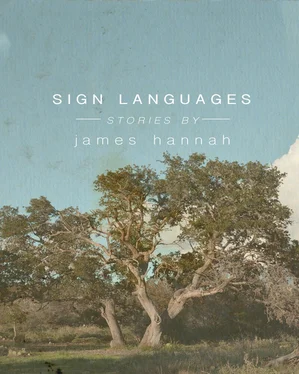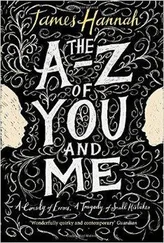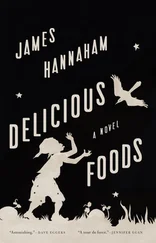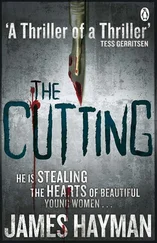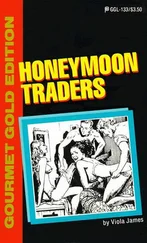James Hannah - Sign Languages
Здесь есть возможность читать онлайн «James Hannah - Sign Languages» весь текст электронной книги совершенно бесплатно (целиком полную версию без сокращений). В некоторых случаях можно слушать аудио, скачать через торрент в формате fb2 и присутствует краткое содержание. Год выпуска: 2015, Издательство: Dzanc Books, Жанр: Современная проза, на английском языке. Описание произведения, (предисловие) а так же отзывы посетителей доступны на портале библиотеки ЛибКат.
- Название:Sign Languages
- Автор:
- Издательство:Dzanc Books
- Жанр:
- Год:2015
- ISBN:нет данных
- Рейтинг книги:5 / 5. Голосов: 1
-
Избранное:Добавить в избранное
- Отзывы:
-
Ваша оценка:
- 100
- 1
- 2
- 3
- 4
- 5
Sign Languages: краткое содержание, описание и аннотация
Предлагаем к чтению аннотацию, описание, краткое содержание или предисловие (зависит от того, что написал сам автор книги «Sign Languages»). Если вы не нашли необходимую информацию о книге — напишите в комментариях, мы постараемся отыскать её.
Sign Languages — читать онлайн бесплатно полную книгу (весь текст) целиком
Ниже представлен текст книги, разбитый по страницам. Система сохранения места последней прочитанной страницы, позволяет с удобством читать онлайн бесплатно книгу «Sign Languages», без необходимости каждый раз заново искать на чём Вы остановились. Поставьте закладку, и сможете в любой момент перейти на страницу, на которой закончили чтение.
Интервал:
Закладка:
Richard thought of his own youth and his “country relatives,” as his father disdainfully called them. But this memory had never been cloaked or forgotten. Richard thought of it often, maybe once or twice a year. For him it was an emblem, a definite lesson, the clearest illustration in his life of why he was Richard, this thirty-four-year-old man.
His mother’s cousins were all great sportsmen; they fished and hunted whatever was in season. And he loved visiting in their houses on holidays because they were all full of energy. One wall, in the oldest cousin’s house, was devoted to guns-shotguns, pistols, deer rifles. There was the foreign and raw smell of bourbon on Christmas afternoon. The men laughed loudly as the women cleared the table. His mother joined in cheerfully; she loved the convoluted familial gossip. But his father sat silently at one end of the wagon-wheel couch coddling a bottle of beer. Richard watched him nod and smile and knew, at fifteen, how foreign all this still must be to his father. It was the South to this man born and raised in Milwaukee.
So Richard tagged along as they visited barns, hung on fences to watch stallions mounting frightened mares. Sex, he couldn’t help noticing, was all noise and unwillingness.
They had dozens of calico cats, black-and-tan squirrel dogs. None of the cousins minded horse shit or kennel smells. They wore scarred boots; he and his father borrowed rubber Wellingtons. Slipped them on in a tack room full of saddles and bits, smells of grease and leather.
After he’d begged and whined for weeks, he and his father joined the cousins early on a mid-November morning to squirrel hunt. Already they smelled of whiskey. His father looked drawn and pale, his hands tight around the barrel of the borrowed shotgun. Tom, who was away at college, had never been interested in these people; had never made such demands on their father.
The woods were frigid and silent. They all shot squirrels; Richard watched his fall thirty feet into the mouths of the dogs, and he was amazed at their eager violence. A cousin his own age grinned and waded into them, smacking heads with a gloved fist.
Before noon, one of the cousins sang out, his voice echoing up dry creek beds, and they all converged on a huge snapping turtle the cousin had dragged from its winter home under a fallen oak. It was awfully old, the elderly cousin said. Its high-domed back was obsidian black and spotted with patches of green, live moss. The closed flaps protecting its head and feet were orange. They all admired the turtle until one cousin bent over and put the muzzle of his shotgun to its emerging beak and fired. Then the others stood back and did the same until there were only pieces of shell and flesh.
Richard and his father neither fired their guns nor looked at one another. Later, on the way home, his father called them savages and Richard decided to abandon them. He turned back to his family and their quiet, solitary lives. He had always felt himself lucky; he figured few people had such clear opportunities. Of course it wasn’t only that one moment in the woods, but it had been a telling event, had become a powerful memory. And, over the years, he didn’t think he had embellished it at all when he occasionally took it out and examined it like a valuable jewel.
The sagging apartment door banged shut; Chip, the redheaded boy, howled like an animal. Near the pile of scaffolding, the two oldest children kissed passionately; Richard wondered how they were related.
He wouldn’t deny the allure of their lives. Even after he’d gone inside he thought about them and returned to look out at their house. He felt he was blushing; his forehead was warm to his touch.
So, in a couple of days, the children returned to the yard to play. They made-believe using the storage shed. And Richard watched them from the couch until one morning he stepped quietly out onto the deck and cautiously sat in a webbed lawn chair.
Chip looked up from his howling game, his fingers dug deeply into Tom’s drought-wrecked grass, and watched Richard. In a moment they all fell silent. The older two came out from behind the shed, their faces blushed and drenched in sweat. Richard almost turned his head away.
They formed a tableau. All around them sprinklers clinked and a hot breeze rattled bamboo wind chimes.
Richard stared at them. It’s all right, he said to himself. Don’t worry. I only want to watch. Everything’s just fine.
The older ones spoke quietly to the younger, and they sat together in a circle for a few minutes. Then, like a football huddle, they touched hands and shouted, resuming play.
In a day’s time they had captured Tom’s backyard. Richard watched them work like ants carrying from the garage apartment broken chairs, bicycles with warped wheels, headless dolls, sacks of clothes. The two oldest — the boy stoop-shouldered with pale eyes, the girl with just a hint of breasts, her nipples hard under her tight T-shirt — wrestled and wrote things on sheets of notebook paper. Like sibyls they paid no mind to them afterward, and the scraps, driven by the hot breezes, plastered the base of the house, flew to catch in other people’s hedges. One night, after they’d retired behind their wall to gather around the fire and cook, Richard collected paper until his back ached. Sitting down at the kitchen table, he looked through the damp sheets at the stick figures in sexual positions he’d never imagined. In some there were stick-figure policemen surrounding houses, bullhorns to lips. In all, the houses were repetitions of the green garage apartment down to the low wall, the scaffolding, the split cement mixer. In one, a redheaded child hung from an upper window. In all of them there wasn’t a single scene indoors.
One morning, with his coffee in his hand, Richard emerged to find the two youngest digging furiously with a spade. They’d already crossed half the yard with a shallow trench, the grass uprooted and turned over.
“Hey, you two!” Richard placed the cup on the railing and stepped down onto the brown grass. But Kimmy only turned around and grinned, her teeth yellow and snaggled. “You shouldn’t do that,” he continued, but Chip didn’t break his rhythm. Instead, without glancing up, he tossed a shovelful of dirt in Richard’s direction.
“Now listen here,” Richard said, and stopped ten feet from them, his clenched fist outstretched. Then he dropped his hand and looked over at the dark sagging door of the apartment.
Who are you? he started to ask. What is all of this?
Instead he went inside and, from the couch, saw them fill the narrow ditch with water from Tom’s unrolled garden hose and begin sailing pieces of wood down it. Soon all four of them joined in and dug a second canal at right angles to the first.
All afternoon they romped in the water and dark mud. The older girl’s neck caught the sunlight like gilt, her eyes down-turned to the toy boats. The older boy taunted Chip until they fought in the trench, clawed and bit and screamed.
Kimmy ignored them and put the dribbling hose into her mouth until her cheeks ballooned. Soon they were all yelling, tearing through the neighbors’ yards, and Richard went around to the side and turned off the water. He noticed that their sailing boats were pieces of painted clapboard siding ripped loose; in some the bent nails were still shiny.
Some mornings they were out by the shed. Once the two youngest were on the deck drinking Dr Peppers at seven in the morning. Soon he began cleaning up after them. He filled the trench, patted down the friable grass. He scrubbed the crayon markings off the deck planking. He noticed he no longer opened his mouth to shout at them when they ran headlong into the shed and bounced off in one of their violent games. But he felt his face flush frequently, his head a bit dizzy as if he’d had too many cups of coffee.
Читать дальшеИнтервал:
Закладка:
Похожие книги на «Sign Languages»
Представляем Вашему вниманию похожие книги на «Sign Languages» списком для выбора. Мы отобрали схожую по названию и смыслу литературу в надежде предоставить читателям больше вариантов отыскать новые, интересные, ещё непрочитанные произведения.
Обсуждение, отзывы о книге «Sign Languages» и просто собственные мнения читателей. Оставьте ваши комментарии, напишите, что Вы думаете о произведении, его смысле или главных героях. Укажите что конкретно понравилось, а что нет, и почему Вы так считаете.
